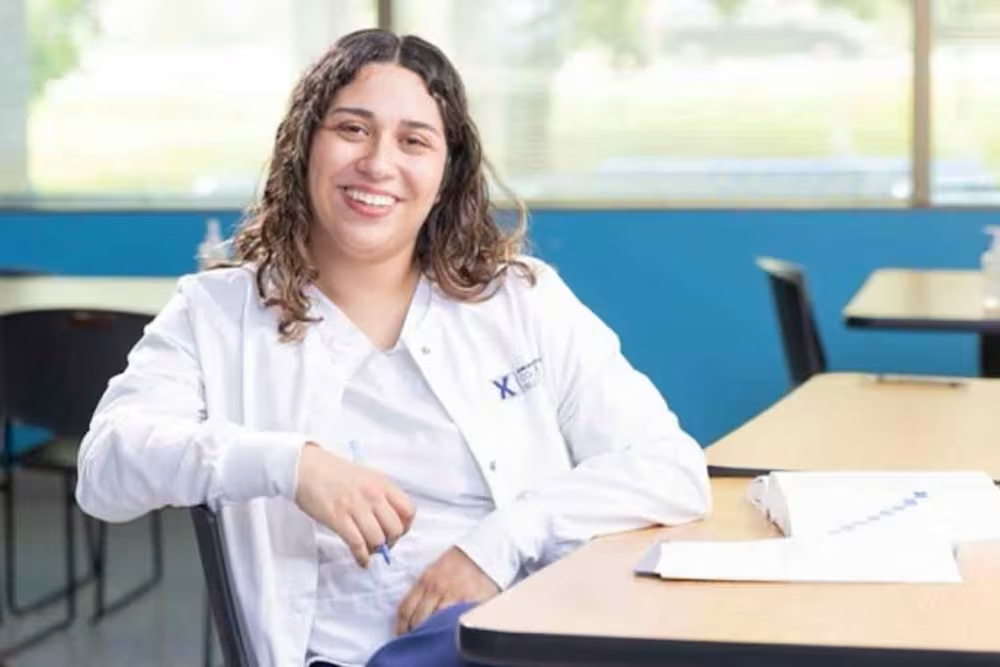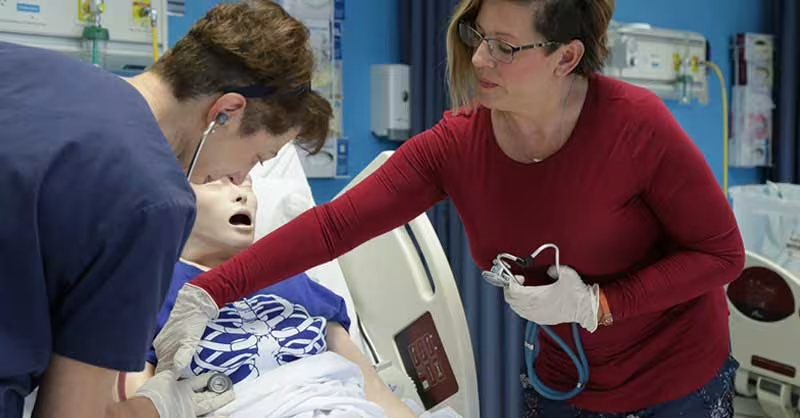What Are Nursing Clinicals? Everything You Need to Know
Each blog post is dated and contains accurate information as of that date. Certain information may have changed since the blog post publication date. If you would like to confirm the current accuracy of blog information, please visit our ABSN program overview page or contact us at 866-890-9467.

At Xavier University, our nursing courses are offered online for your convenience. Online courses also allow you the flexibility to review the material as many times as needed to understand and apply what you’ve learned. Yet, becoming a nurse requires more than conceptual knowledge; it also requires a hands-on patient care experience. That’s why nursing programs like our Accelerated Bachelor of Science in Nursing (ABSN) program include clinical rotations, also known as clinicals or nursing clinicals.
What are nursing clinicals? They’re an in-hospital learning component that allows you to work directly with patients while you’re still a nursing student. They can be intimidating, but also the most exciting time of nursing school as you prepare to launch your career.
While you’re looking ahead to starting nursing school, you’ll want to learn more about clinicals and get the answers to common questions, such as What are clinicals’ benefits for students and why are they important? and What do you learn in nursing clinicals? You should also learn how you can prepare for them and what supplies you’ll need.

Discover what you should know before relocating to Ohio for an ABSN program.
What Are Clinicals in Nursing School?
What are nursing clinicals? They’re an in-hospital learning component that allows you to work directly with patients while still a nursing student. Knowing how clinicals fit into your degree program can help you fully understand the definition and role of clinicals. Your nursing education at Xavier consists of three main components:
- Online coursework
- In-person nursing skills and simulation labs
- Clinical rotations
Your coursework teaches nursing theories and concepts. Skills and simulation labs develop nursing skills, such as placing an IV line and working through patient care situations. Clinicals allow you to take everything that you’ve learned in coursework and labs and put that knowledge into practice in actual healthcare facilities.
At Xavier, you’ll begin clinicals in the first semester. The curriculum is progressive, meaning your responsibilities during your first clinical will correspond to what you’ve been taught so far in your coursework and labs. You won’t be required to handle complex nursing tasks until you’re ready.
Explore the role of simulation labs in your nursing education.

What to Expect in Nursing Clinicals
Clinicals are supervised, real-world experiences that form the core of your nursing education, exposing you to different patient populations in various practice settings. The length of clinical rotations varies, but you can expect to work two to three clinicals per semester. Clinicals are equivalent to one to three credits, and one shift may last up to 12 hours.
Starting clinicals in the first semester is unique to the ABSN program, as most traditional BSN students don’t begin clinicals until their third year. With an earlier start, you can apply the material you learn from the classroom and simulation labs directly to your clinicals.
You will complete clinicals with an array of focuses throughout your time in Xavier University’s nursing program. These focuses include:
- Health in the community
- Holistic mental health nursing care
- Medical-surgical
- Women’s health
You can expect to learn by doing during your clinicals. Some of the nursing skills reinforced in clinicals include:
- Charting
- Development of nursing care plans
- Medication administration
- Patient assessments
- Patient communication
- Vital signs monitoring
- Wound care

Clinicals are active learning environments where you and other students in your cohort perform tasks a nurse would typically complete daily. Our clinical placement sites include:
- Hospitals
- Mental health facilities
- Outpatient clinics
Working in numerous clinical settings will help you become a more well-rounded nurse. You will experience what it is like to treat patients of all backgrounds as you diversify your knowledge through clinical experiences.
This will also help you decide where to work after graduation. You will have options both inside and outside the hospital setting. For some, the fast-paced environment of the emergency department is ideal, while others prefer working in labor and delivery with mothers and newborns. Working outside the hospital in an independent family practice could be the best choice for others. Your experience in clinicals will help you discover what path you would like to take after graduating before committing to a full-time job.
Role Transition
During your final semester, you’ll participate in a role transition experience. This is where you gain concentrated clinical experience under the guidance of a preceptor, a trained registered nurse. You’ll work the same shifts as your preceptor, and as you refine your skills and build rapport with patients, you’ll take an active role in their care. This will help you gain confidence as you prepare to gain licensure and enter the workplace after graduating.

Why Clinical Rotations Are Essential for Nursing Students
Clinical rotations bridge the gap between theoretical knowledge and hands-on application. They allow you to refine your nursing skills while learning to work with patients and fellow clinicians.
You’ll also learn how to navigate the clinical environment, such as following proper hospital protocols. Furthermore, clinicals provide exposure to different nursing specialties, which can be valuable when planning your career.
How to Prepare for Nursing Clinicals
Your nursing clinicals will give you realistic experience as a nursing professional, so you must prepare accordingly.
Ensure you have the proper scrubs/lab coat for clinicals according to Xavier’s uniform guidelines. It is important to wear your uniform with pride and professionalism to present yourself and the university in a positive light. Invest in a comfortable pair of shoes as well, since you will be spending a great deal of time on your feet.
With all the time you will be spending in the healthcare facility during your nursing clinicals, you will also want to bring some additional supplies:
- Note-taking supplies will help you jot down any details or instructions and will be a huge help for later when you want to look back at what you learned during your clinicals.
- A wristwatch can help when taking vitals and keeping track of the facility’s busy schedule.
- A stethoscope will also help with taking vitals and becoming familiar with medical tools.
- Healthy snacks are a must for long days at a medical facility. You must have plenty of energy to keep up with the job.
- A water bottle can help you stay hydrated and alert, especially in fast-paced environments.
- Any other supplies your instructor asks you to bring.
Carry all these items in a durable bag labeled with your name to help keep you organized.

Start Your Nursing Journey
As an accelerated nursing student, you’ll clock many hours of hands-on practice in your clinical rotations that will help you to emerge from nursing school as a fully equipped, confident nurse. At Xavier, you can expect a supportive, personalized learning experience. You’ll have access to attentive instructors, Academic Success Coaches and NCLEX-RN prep resources.
If you have a non-nursing bachelor’s degree and want to start developing your nursing skills, contact an admissions adviser today. Our ABSN program offers two enrollment locations in Cleveland and Columbus, Ohio.
